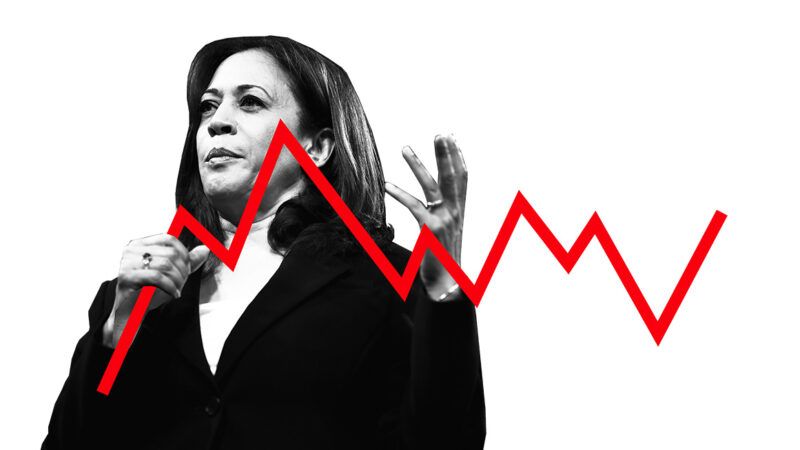Why the Race and Gender Politics of White Dudes for Harris Failed
It's still the economy, stupid.

Leading up to the 2024 election, pundits, pollsters, and political operatives discussed the electorate as a bundle of distinct race and gender categories, sometimes with even narrower subcategorizations attached. How would black women vote? What about Latino men? Suburban, college-educated women?
Some of this was useful for analyzing electoral subgroups. But the assumption, especially in left-friendly outlets, was that the best way to win over specific demographic categories was to target them with direct race- and gender-based appeals. Democrats seemed to engage in this practice reflexively, dividing themselves into semi-ironic groups such as White Dudes for Harris.
The Democratic nominee, Kamala Harris, a woman with black and Indian ancestry, rarely emphasized her own race or gender. But she didn't distance herself from this approach either. When she seemed to be losing potential votes from black men, her campaign rolled out a series of initiatives billed as targeting black male voters specifically: loans for business creation, a plan to protect cryptocurrency assets, and federal legalization of marijuana. But these were just general initiatives the campaign's messaging arm reframed as providing benefits specifically for black men.
She might have been better off pitching her agenda more broadly. Even as Democrats worked on targeted outreach to narrowly defined groups based on race and gender, the race's top issues for voters were economic. Inflation, particularly the cost of groceries and gas, defined the election.
Harris ended up losing to President Donald Trump. And while Trump himself was often an erratic messenger, going on long, wild tangents during his many sprawling speeches, his campaign apparatus focused relentlessly on inflation and other core economic issues that appealed to everyone. Trump's most notable demographically sliced outreach was to young men, but even there his approach was not to emphasize gender issues specifically; it was to appear on platforms that specifically appealed to young men. He met them on familiar territory with familiar faces.
The subjects of discussion tended to line up with either Trump's usual interests or the host's. On Lex Fridman's podcast they covered UFOs and Jeffrey Epstein. With comedian Theo Von, he talked about drugs. One of Trump's first podcast stops was on a show hosted by the Nelk Boys, a bro prankster duo popular with Ultimate Fighting fans.
Democrats spent much of the campaign attacking Trump as harmful to women and minorities. After all, the argument went, he had been convicted in civil court of sexual abuse, and his Supreme Court nominees were decisive in overturning Roe v. Wade, allowing 17 states so far to ban or effectively ban abortion. He pushed mass deportation, and he famously launched his 2016 presidential run by attacking Mexican immigrants. "When Mexico sends its people," he said, "they're not sending their best….They're bringing drugs. They're bringing crime. They're rapists. And some, I assume, are good people." How could such a person possibly appeal to women and minorities?
And yet: Abortion rights did not prove a surefire winner with women voters—millions voted for both abortion rights ballot measures and Trump. Meanwhile, Trump made significant inroads among Hispanic voters, especially men. In the end Trump won the popular vote and made gains in nearly every demographic.
Before the election, Democrat ad makers had evidence that narrowly targeted messages weren't working against Trump: Future Forward, a Democratic Party–aligned super PAC that specializes in data-driven ad targeting, ranked hundreds of ads and found that more general appeals worked best.
The group's overarching idea, The New York Times reported in October, was "to target everyone at once"—reaching "white, Black, Asian and Hispanic voters—as well as the electorate overall" with ads that emphasized Harris' positions on the economy. But the group faced pushback from Democratic officeholders and influencers who wanted more distinctively race-specific messaging.
In the aftermath of Democrats' election loss, however, some may be altering their approach. In November, Punchbowl News reported the Congressional Hispanic Caucus was "rethinking its messaging strategy" to emphasize general economic appeals. As Rep. Juan Vargas (D–Calif.) told Punchbowl, "Hispanic families, in particular, are saying everything is really expensive. They felt like we weren't paying attention.….What we don't handle well is the cost of living, and that really hurt us."
In 1992, cantankerous Democratic campaign guru James Carville famously declared, "It's the economy, stupid." That became an unofficial slogan for Democratic nominee Bill Clinton's successful presidential campaign, which focused heavily on broad-based, unifying economic concerns while downplaying race-and gender-specific differences. Three decades later, Trump's win suggests that's still true.
This article originally appeared in print under the headline "It's Still the Economy, Stupid."


Show Comments (145)